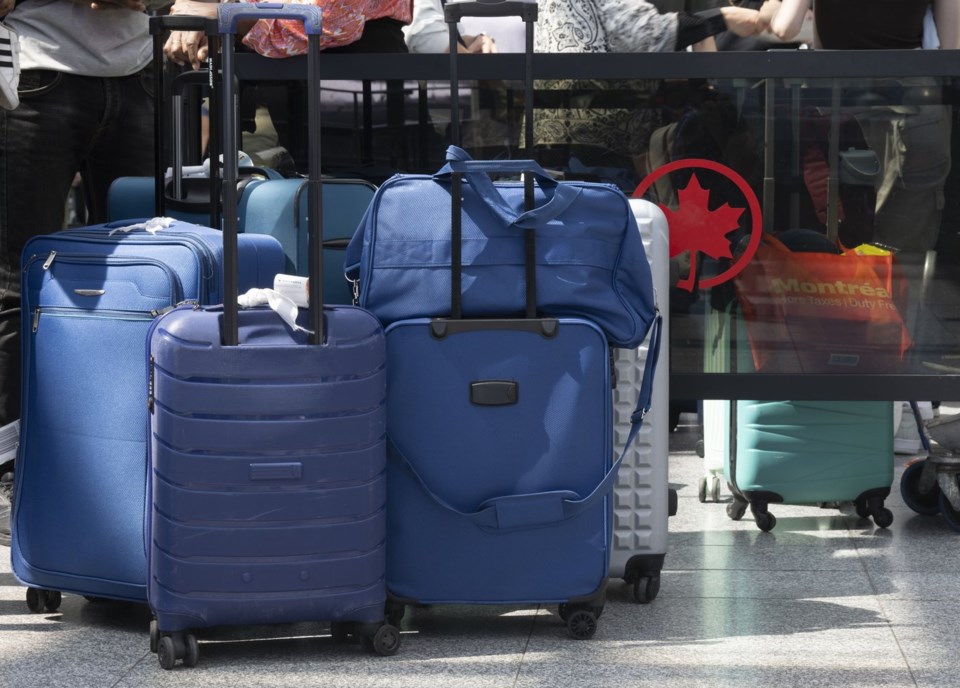Air Canada flights are cancelled after thousands of flight attendants began a strike early Saturday morning.
The company says the work stoppage means all Air Canada and Air Canada Rouge flights would be cancelled amid the work stoppage. Around 130,000 customers will be affected each day that the strike continues.
For summer travellers worried about what this means for their plans, here's what you need to know.
Has a strike started?
Yes. More than 10,000 flight attendants working for Air Canada have walked off the job.
The Air Canada component of the Canadian Union of Public Employees said the two sides were unable to reach a deal before the 12:58 a.m. ET deadline on Saturday.
Will all Air Canada flights be cancelled?
The work stoppage affects Air Canada’s main operations and Air Canada Rouge.
Air Canada began a gradual suspension of flights in advance of the strike deadline to allow an orderly shutdown leading up to Saturday. More than 600 flights were cancelled affecting 100,100 customers.
Flight attendants working for Jazz and PAL, which operate Air Canada Express flights, are not part of the strike. Flights under those banners will continue to operate as normal.
What should I know about my upcoming flight?
Air Canada has said it will notify customers via email and text message if their flights have been cancelled.
The airline has said passengers whose flights are cancelled will be offered a full refund or the opportunity to change their travel plans without a fee.
The company also said it has made arrangements with other Canadian and foreign carriers to provide customers with alternative travel options to the extent possible. That includes passengers whose itineraries change mid-journey.
"However, given other carriers are already very full due to the summer travel peak, securing such capacity will take time and, in many cases, will not be immediately possible," it said.
Air Canada said it strongly advises affected customers not to go to the airport unless they have a confirmed ticket on an airline other than Air Canada or Air Canada Rouge.
For customers due to travel soon whose flights are not yet cancelled, Air Canada said it will allow them to rebook their travel or obtain a credit for future travel.
The airline has cautioned that under Canada’s Airline Passenger Protection Regulations, customers are not eligible for compensation for delayed or cancelled flights, meals, hotels for situations outside the carrier's control, such as a strike or lockout.
How did we get here?
The two sides have been in contract talks since the start of the year, but concluded a conciliation process without reaching a deal.
On July 28, the union's strike mandate vote kicked off. It wrapped Aug. 5, with CUPE announcing its members voted 99.7 per cent in favour of a strike mandate.
At first, both sides seemed optimistic they could avoid a work stoppage despite the strong strike mandate. They returned to the bargaining table on Aug. 8.
But on Tuesday, Air Canada said it had reached an "impasse" in negotiations with the union as the two sides were "far apart" on key issues. The union told its members that the company "decided they no longer want to negotiate."
CUPE rejected a proposal by Air Canada to enter a binding arbitration process. That would have suspended the union's right to strike, as well as Air Canada's right to lock out union members. While Air Canada argued there was precedent to go that route, CUPE said it preferred to negotiate a contract that its members could then vote on.
The union issued a strike notice hours after talks broke down, while Air Canada issued a 72-hour lockout notice. The parties weren't able to reach a deal in the days that followed as both accused one another of not wanting to negotiate.
Air Canada has requested government-directed arbitration to end the dispute, however Jobs Minister Patty Hajdu has not said whether Ottawa will oblige.
What is this dispute all about?
The union has said its main sticking points revolve around what it calls flight attendants' “poverty wages” and unpaid labour when planes aren't in the air. It told members it has put forward a proposal seeking cost of living enhancements each year, with a catch-up "to where we should be at for 2025."
CUPE said entry-level Air Canada flight attendants' wages have increased 10 per cent, or $3 per hour, over the past 25 years, which has been far outpaced by inflation.
It also said flight attendants are not paid "for a significant portion of their time on the job," such as when performing safety checks, attending to onboard medical and safety emergencies, and assisting passengers with boarding and deplaning.
Air Canada said its latest offer included 38 per cent total compensation increases over four years, including 25 per cent in the first year. It said that proposal also addressed the issue of ground pay, improved pensions and benefits, increased crew rest and other enhancements to work-life balance.
The airline said that offer would make its flight attendants the best compensated in Canada. But it said the union submitted a counter-offer "seeking exorbitant increases beyond those presented in earlier submissions."
This report by The Canadian Press was first published Aug. 16, 2025.
Companies in this story: (TSX:AC)
Sammy Hudes, The Canadian Press



